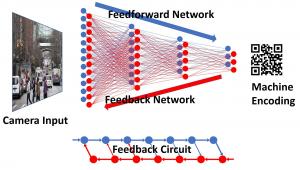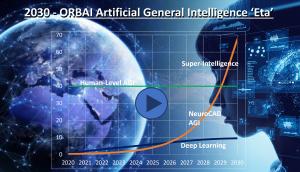USPTO Issues Landmark Patent to Artificial Intelligence Startup, ORBAI
These innovations in Spiking Neural Networks are analogous to Nicola Tesla's innovations that made AC current practical and able to surpass DC current as the standard for electricity in the 1900s.”
SANTA CLARA, CA, USA, November 2, 2022 /EINPresswire.com/ -- ORBAI, a Silicon Valley Startup, was issued a landmark AI Patent this week by the US Patents and Trademarks Office, covering tools and methods for a revolutionary 3rd generation of AI based on an entirely new set of spiking neural network technologies that takes a huge leap past today's 2nd generation deep learning AI.— Brent Oster, CEO ORBAI
These technologies will enable more advanced AI applications, with conversational speech, human-like cognition, and planning and interaction with the real world, actively learning without supervision. They will find first use in smart devices, homes, and robotics, then in online professional services.
What we usually think of as Artificial Intelligence (AI) today, when we see human-like robots and holograms in our fiction, talking and acting like real people and having human-level or even superhuman intelligence and capabilities, is actually called Artificial General Intelligence (AGI), and it does NOT exist anywhere on earth yet. What the AI industry actually has today is much simpler and much more narrow Deep Learning (DL) that can only do some very specific tasks better than people and has fundamental limitations that will not allow it to become AGI. Without neural networks that have spatial-temporal processing and learn at runtime from new data, current Gen 2 Deep Neural Networks are unable to fully realize true computer vision, robust speech recognition, and interpretation of the environment and data inputs.
The patent covers ORBAI's NeuroCAD SNN Toolkit and processes for designing 3rd generation Spiking Neural Networks and training and evolving them towards applications in vision, speech, control, planning, and analytics. The Patent is Application No. 16/437,838, titled "Apparatus and method for utilizing a parameter genome characterizing neural network connections as a building block to construct a neural network with feedforward and feedback paths".
The methods in the patent solve the greatest obstacle to date to using Gen 3 SNNs that have previously prevented their widespread adoption - training SNNs to do useful functions, as standard backpropagation techniques used in deep learning do not work with SNNs because of their time domain properties. The ORBAI patent implements training of the network using a SNN autoencoder with a feedback loop, all tuned by genetic algorithms. These innovations in Spiking Neural Networks are a major breakthrough, making training them possible for practical purposes for the first time. This accomplishment is analogous to Nicola Tesla's innovations that made AC current practical and able to surpass DC current as the standard for electricity in the 1900s.
By building on this NeuroCAD toolchain and SNN technology shaped by genetic algorithms, ORBAI is designing Artificial General Intelligence that will enable more advanced AI applications, with conversational speech, human-like cognition, and planning and interaction with the real world, learning without supervision. It will find first use in smart devices, homes, and robotics, then in online professional services and enhanced analytics, forecasting, and decision making capabilities in financial forecasting and enterprise software, all with an AGI at the core powering them.
ORBAI's business model is to license the development tools to customers and also work alongside 3rd party developers to create custom integrated AI solutions for customers. Customers will then have access to the core AGI as AI as a Service (AIaaS), enabling our developer network to connect to it with data and applications for various customer needs.
ORBAI is a California-based startup developing artificial general intelligence to power smart devices and intelligent online professional services (www.orbai.com) with core AGI technology that will be licensed to companies doing devices and AI professional services.
Brent Oster
ORBAI
brent.oster@orbai.com
Visit us on social media:
Facebook
LinkedIn
ORBAI Pitch Video
Legal Disclaimer:
EIN Presswire provides this news content "as is" without warranty of any kind. We do not accept any responsibility or liability for the accuracy, content, images, videos, licenses, completeness, legality, or reliability of the information contained in this article. If you have any complaints or copyright issues related to this article, kindly contact the author above.



